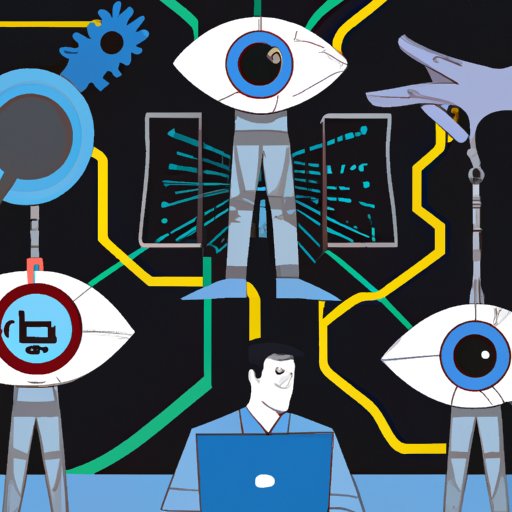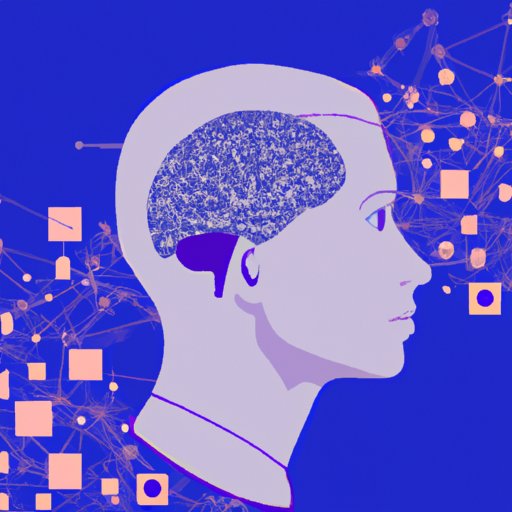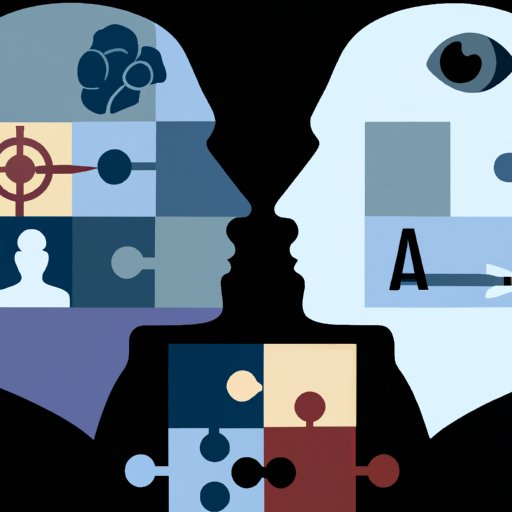Introduction
Artificial intelligence (AI) is a form of technology that seeks to replicate certain cognitive functions associated with human intelligence. AI is used in a variety of industries, from healthcare to finance, and it has the potential to revolutionize how we live and work. However, there are also some potential risks associated with AI that must be addressed before its full potential can be realized.
The purpose of this article is to explore the ethical, moral, and social issues associated with AI. We will examine the potential for unethical use of AI, the potential for discrimination, the security risks associated with AI, and the potential for AI to create unintended consequences. We will also discuss the possibility of AI taking over human jobs and increasing inequality.
Exploring the Ethical and Moral Dilemmas of AI
One of the major ethical and moral dilemmas associated with AI is the potential for unethical use of AI. AI systems are capable of making decisions based on data and algorithms, but they may not always make ethical decisions. There is also the potential for AI to be used for malicious purposes, such as manipulating public opinion or spreading false information. This could have serious implications for democracy, human rights, and other core values.
There is also the potential for AI to be used to discriminate against certain groups of people. AI systems are capable of learning from data, and if the data they learn from is biased, then the decisions they make could be discriminatory. For example, AI-powered facial recognition systems have been shown to be less accurate when identifying people of color compared to white people, which could lead to unfair treatment.
Finally, there is a lack of transparency when it comes to AI. AI systems are often opaque, meaning that it is difficult to understand how they make decisions. This lack of transparency could lead to the misuse of AI and could prevent individuals from understanding why their data was used in a particular way.

Examining the Potential Impact of AI on Employment
Another major concern related to AI is its potential impact on employment. AI systems are capable of automating certain tasks, which could lead to job loss in certain sectors. Furthermore, those who do not have access to high-quality education may find it difficult to gain access to the well-paying AI jobs that require a higher level of expertise.
In addition, there is a lack of human oversight when it comes to AI. AI systems are capable of making decisions without any human input, which could lead to mistakes or errors that could have serious implications. As such, it is important to ensure that there is appropriate oversight and regulation of AI systems in order to reduce the risk of mistakes.

Investigating the Security Risks of AI
Another major concern associated with AI is its potential security risks. AI systems are capable of collecting and processing large amounts of data, which could make them vulnerable to data breaches. Furthermore, AI systems are capable of being used for malicious purposes, such as fraud or phishing attacks.
Additionally, AI systems are susceptible to hacking. Hackers can exploit weaknesses in AI systems in order to gain access to sensitive data or manipulate the system for their own gain. As such, it is important to ensure that AI systems are secure and that there are appropriate measures in place to protect them from malicious actors.
Assessing the Social Impact of AI
In addition to the ethical and security concerns associated with AI, there is also the potential for AI to have a negative social impact. AI systems are capable of replacing human interactions, which could lead to increased isolation and loneliness. Furthermore, AI systems are capable of making decisions based on data, which could lead to bias in decision making.
Finally, there is the potential for AI to create unintended consequences. AI systems are complex and unpredictable, and it is difficult to anticipate all of the potential outcomes of using AI. As such, it is important to consider the potential long-term implications of using AI before implementing it.

Analyzing the Potential for AI to Create Unintended Consequences
The potential for AI to create unintended consequences is a major concern. AI systems are capable of producing unforeseen outcomes, such as the potential for an AI system to be manipulated in order to cause harm. Additionally, AI systems are capable of producing unanticipated repercussions, such as the potential for AI to exacerbate existing inequalities or disrupt existing social structures.
Furthermore, AI systems are capable of creating unintended consequences that are difficult to predict. AI systems are complex and unpredictable, and it is difficult to anticipate all of the potential outcomes of using AI. As such, it is important to consider the potential long-term implications of using AI before implementing it.
Discussing the Possibility of AI Taking Over Human Jobs
Another major concern related to AI is the potential for AI to take over human jobs. AI systems are capable of automating certain tasks, which could lead to job displacement in certain sectors. Furthermore, AI systems are capable of performing tasks more efficiently than humans, which could lead to widespread unemployment.
Additionally, the use of AI could lead to increased inequality. Those who do not have access to high-quality education may find it difficult to gain access to the well-paying AI jobs that require a higher level of expertise. This could lead to an increase in income inequality, as those with access to these jobs would have a greater advantage than those without.

Examining the Potential for AI to Increase Inequality
The potential for AI to increase inequality is a major concern. AI systems are capable of exacerbating existing wealth gaps, as those with access to the most advanced AI technologies will have an advantage over those without. Additionally, AI systems are capable of widening racial divides, as AI systems are more likely to perpetuate existing biases and stereotypes.
Finally, AI systems are capable of heightening gender inequality. AI systems are more likely to favor male candidates over female candidates, which could lead to fewer opportunities for women in the workforce. As such, it is important to ensure that AI systems are designed with fairness and equality in mind.
Conclusion
In conclusion, AI presents both opportunities and risks. The ethical, moral, social, and security risks associated with AI must be addressed before its full potential can be realized. Additionally, AI has the potential to create unintended consequences and to increase inequality, which could have serious implications for society. As such, it is important to ensure that AI is used responsibly and ethically.
In order to ensure that the potential risks associated with AI are minimized, there must be appropriate oversight and regulation of AI systems. Additionally, it is important to ensure that AI systems are designed to promote fairness and equality. Finally, it is important to educate the public about the potential risks associated with AI so that they can make informed decisions.
AI has the potential to revolutionize how we live and work, but it is important to ensure that it is used responsibly and ethically. Only then can we fully realize its potential.
(Note: Is this article not meeting your expectations? Do you have knowledge or insights to share? Unlock new opportunities and expand your reach by joining our authors team. Click Registration to join us and share your expertise with our readers.)
